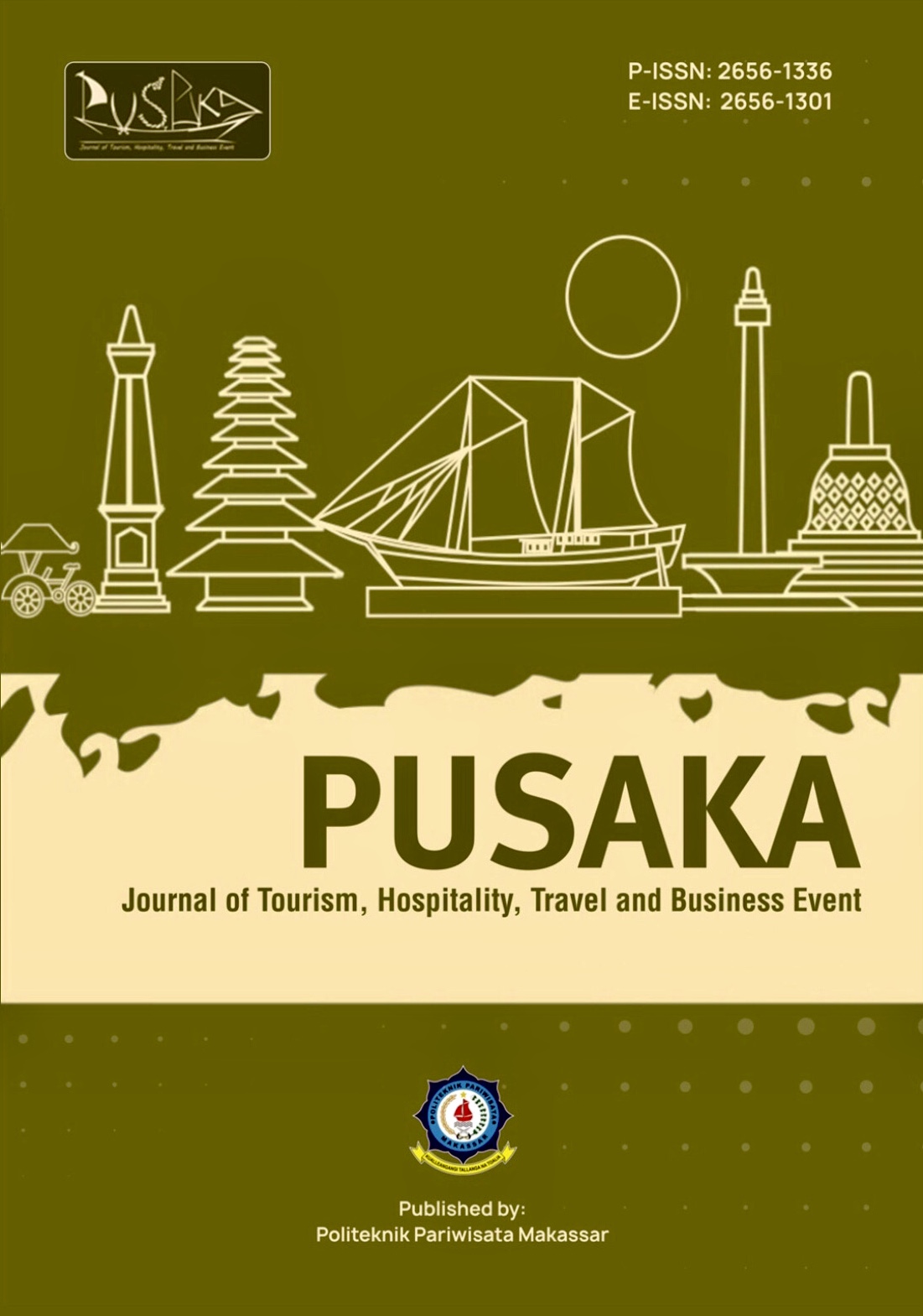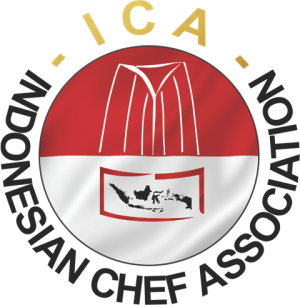Competency Standardization for Indonesian Tourism Human Resources: Implementation in Education, Training and Competency Certification
DOI:
https://doi.org/10.33649/pusaka.v4i2.109Keywords:
Tourism education and training, competency certification, work competency standards, human resources, tourismAbstract
The increasing trend of Indonesia's tourism competitiveness has placed it as one of the priority industrial sectors in Indonesia. However, this achievement is not in line with increasing the competitiveness of human resources (HR). The national work competency standardization system (SKKN), which the Indonesian Government has implemented since 2012, has not been effective, and human resources' competitiveness has even shown a negative trend. It is feared that this situation will hamper the growth rate of Indonesia's tourism competitiveness in the future. The purpose of this study is to critically analyze the application of the SKKNI system, which is focused on education, training, and competency certification of Indonesian tourism human resources, to uncover the inhibiting factors for its implementation. This education, training, and competency certification are the main components in the performance of the SKKNI system in Indonesia. The research was carried out by reviewing the relevant literature, analyzing the processes and elements in applying the SKKNI system. Research data is secondary data collected from data sources of Government and non-government institutions and scientific and non-scientific literature available on official government websites and the internet. The research results are then triangulated to get a comprehensive picture and understanding of the application of the SKKNI system. The results showed that the implementation of the SKKN system was effective in increasing the capacity of Indonesian tourism human resources but has a tiny growth Quantitatively. The main obstacle is limited trainer, assessor, facilities, and educational, training, and certification institutions to produce trained and certified human resources of tourism.
References
Bécherel, L. (2012). Framework for human resources
development strategy at the macro-level: A
situational analysis of Tourism Human Resources
in Bahia, Brazil. Tourism in South America, 6480,
–98. https://doi.org/10.1300/J149v01n03
Becherel, L., & Cooper, C. (2002). The impact of
globalization on human resource management in
the tourism sector. Tourism Recreation Research,
(1).
https://doi.org/10.1080/02508281.2002.11081351
Björn Münstermann, & Weitzel, T. (2008). What is
Process? CONF-IRM 2008 Proceedings, 64.
http://aisel.aisnet.org/confirm2008/64
Black, R., & Ham, S. (2005). Improving the quality of
tour guiding: Towards a model for tour guide
certification. Journal of Ecotourism, 4(3), 178–
https://doi.org/10.1080/14724040608668442
Boo, S., & Kim, SH (2020). The Relationship between
Hospitality Industry Certification and Course
Performance across Multiple Semesters. Journal
of Hospitality and Tourism Education, 32(2), 112–
https://doi.org/10.1080/10963758.2019.1654893
Deale, CS, & Schoffstall, D. (2015). Hospitality and
Tourism Education and Industry Certifications.
Journal of Hospitality and Tourism Education,
(3), 112–119.
https://doi.org/10.1080/10963758.2015.1064319
Formica, S. (1996). European hospitality and tourism
education: differences with the American model
and future trends. International Journal of
Hospitality Management, 15(4), 317–323.
https://doi.org/10.1016/s0278-4319(96)00039-4
Hashimoto, K. (2003). Certification of managers:
Upgrading the casino industry. Journal of
Hospitality and Tourism Education, 15(2), 30–35.
https://doi.org/10.1080/10963758.2003.10696766
Hitchcock, L. (2005). Industry certification: value,
validity, and a place for SoDIS®. SIGCSE Bull.,
(4), 59–63.
http://doi.acm.org/10.1145/1113847.1113878
Hui, L., & Cargill, CF (2017). Setting Standards for
Industry: Comparing the Emerging Chinese
Standardization System and the Current US
System. In Policy Studies (Issue 75).
https://gateway.library.qut.edu.au/login?url=https:
//search.proquest.com/docview/1923968680?acco
untid=13380%0Ahttps://qut.primo.exlibrisgroup.c
om/discovery/openurl?institution=61QUT_INST
&vid=61QUT_INST:61QUT&?url_ver=Z39.88-
&rft_val_fmt=info:ofi/fmt:k
Kasiri, LA, Guan Cheng, KT, Sambasivan, M., & Sidin,
SM (2017). Integration of standardization and
customization: Impact on service quality,
customer satisfaction, and loyalty. Journal of
Retailing and Consumer Services, 35(November
, 91–97.
https://doi.org/10.1016/j.jretconser.2016.11.007
Liu, HHJ (2006). A highlight of tourism and hospitality
education issues in Taiwan: From the hospitality
human resource manager's point of view. Journal
of Teaching in Travel and Tourism, 6(3), 89–102.
https://doi.org/10.1300/J172v06n03_05
Marcis, JG, & Bland, EM (2001). The value of
professional certifications in academe. Atlantic
Economic Journal, 29(1), 116.
https://doi.org/10.1007/BF02299939
Moreo, A., Green, AJ, & O'Halloran, R. (2018). What
certifications are important in the hospitality
industry? Journal of Human Resources in
Hospitality and Tourism, 17(1), 121 –135.
https://doi.org/10.1080/15332845.2017.1340757
Pine, R. (2001). Standardization of tourism education and
training to address the increasing demand for
tourism staff in the East Asia/pacific region. Asia
Pacific Journal ofTourism Research, 6(1), 20–25.
https://doi.org/10.1080/10941660108722084
Qiqi, D., & Rova, L. (2014). Tourism development and
Human Resources challenges (Gjirokastra
Region). European Journal of Sustainable
Development, 3(3), 211–218.
https://doi.org/10.1 4207/ejsd.2014.v3n3p211
Saad, SK (2013). Contemporary Challenges of Human
Resource Planning in Tourism and Hospitality
Organizations: A Conceptual Model. Journal of
Human Resources in Hospitality and Tourism,
(4), 333–354. https://doi.org/10.1080/15332845.2013.790246
Samuels, JB (2000). Certification: A continually
perplexing issue facing hospitality, tourism, and
related professions. Journal of Hospitality and
Tourism Education, 12(1), 47–51.
https://doi.org/10.1080/10963758.2000.10685269
Semone, P. (201 2). A Case Study: Enhancing Laos'
Tourism Sector Performance Through Destination
Human Resource Development. Asia Pacific
Journal of Tourism Research, 17(2), 164–176.
https://doi.org/10.1080/10941665.2011.617049
Spivak, SM, & F. Cecil Brenner. (2001). Standardization
Essentials: Principles and Practice (1st ed.). CRC
Press - Taylor & Francis Group.
Sun, S., Liu, Z. (George), Law, R., & Zhong, S. (Eva).
(2017). Exploring human resource challenges in
China's tourism industry. Tourism Recreation
Research, 42(1), 72–83.
https://doi.org/10.1080/02508281.2016.1253199
Tarí, JJ, Pereira-Moliner, J., Molina-Azorín, JF, & LópezGamero, MD (2020). Quality standards and
competitive advantage: the role of human issues in
tourism organizations. Current Issues in Tourism,
(20), 2515–2532.
https://doi.org/10.1080/13683500.2019.1653833
Wang, J., Ayres, H., & Huyton, J. (2010). Is tourism
education meeting the needs of the tourism
industry? An Australian case study. Journal of
Hospitality and Tourism Education, 22(1), 8–14.
https://doi.org/10.1080/10963758.2010.10696964
Wiley, C. (1999). A comparative analysis of certification
in human resource management. International
Journal of Human Resource Management, 10(4),
–762.
https://doi.org/1 0.1080/095851999340378
Wong, SCK, & Lee, PC (2017). Competencies of training
professionals in the Hong Kong hotel industry.
Journal of Human Resources in Hospitality and
Tourism, 16(4), 384–400.
https://doi.org/10.1080/15332845.2017.1266872
Yeşiltaş, M., Öztürk, Y., & Hemmington, N. (2010).
Tourism education in Turkey and implications for
human resources. Anatolia, 21(1), 55–71.
Downloads
Published
How to Cite
Issue
Section
License

This work is licensed under a Creative Commons Attribution-ShareAlike 4.0 International License.






















